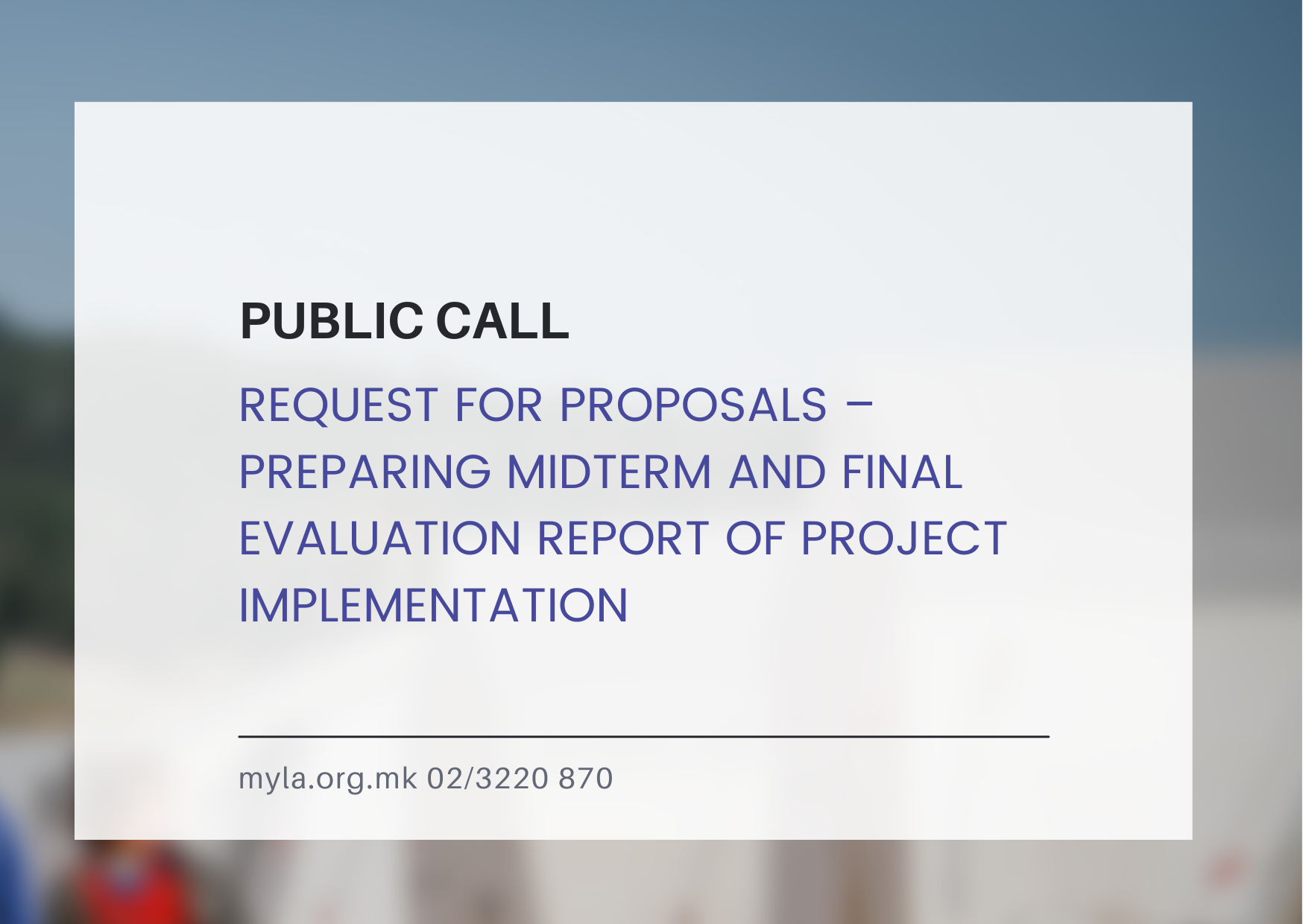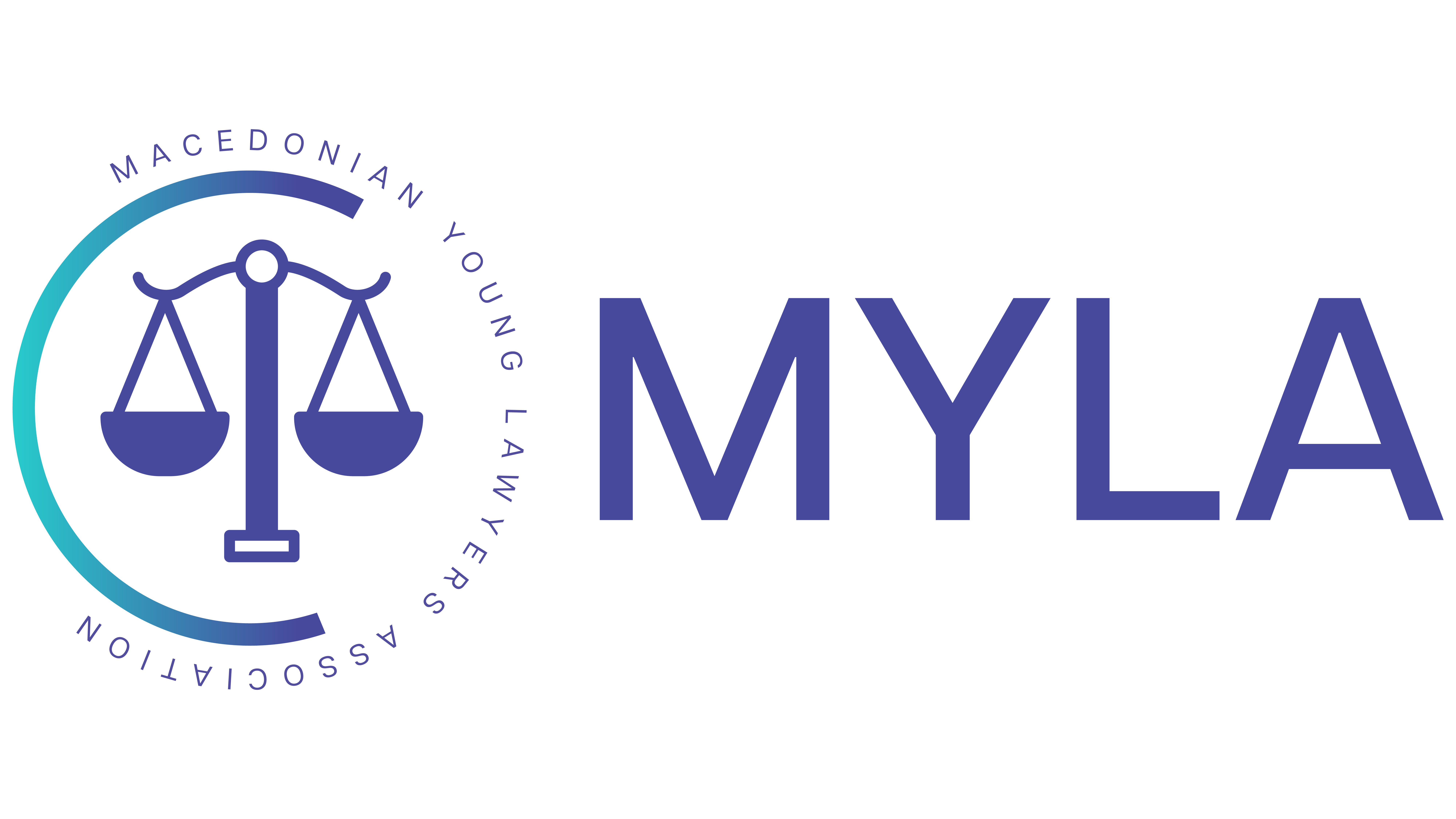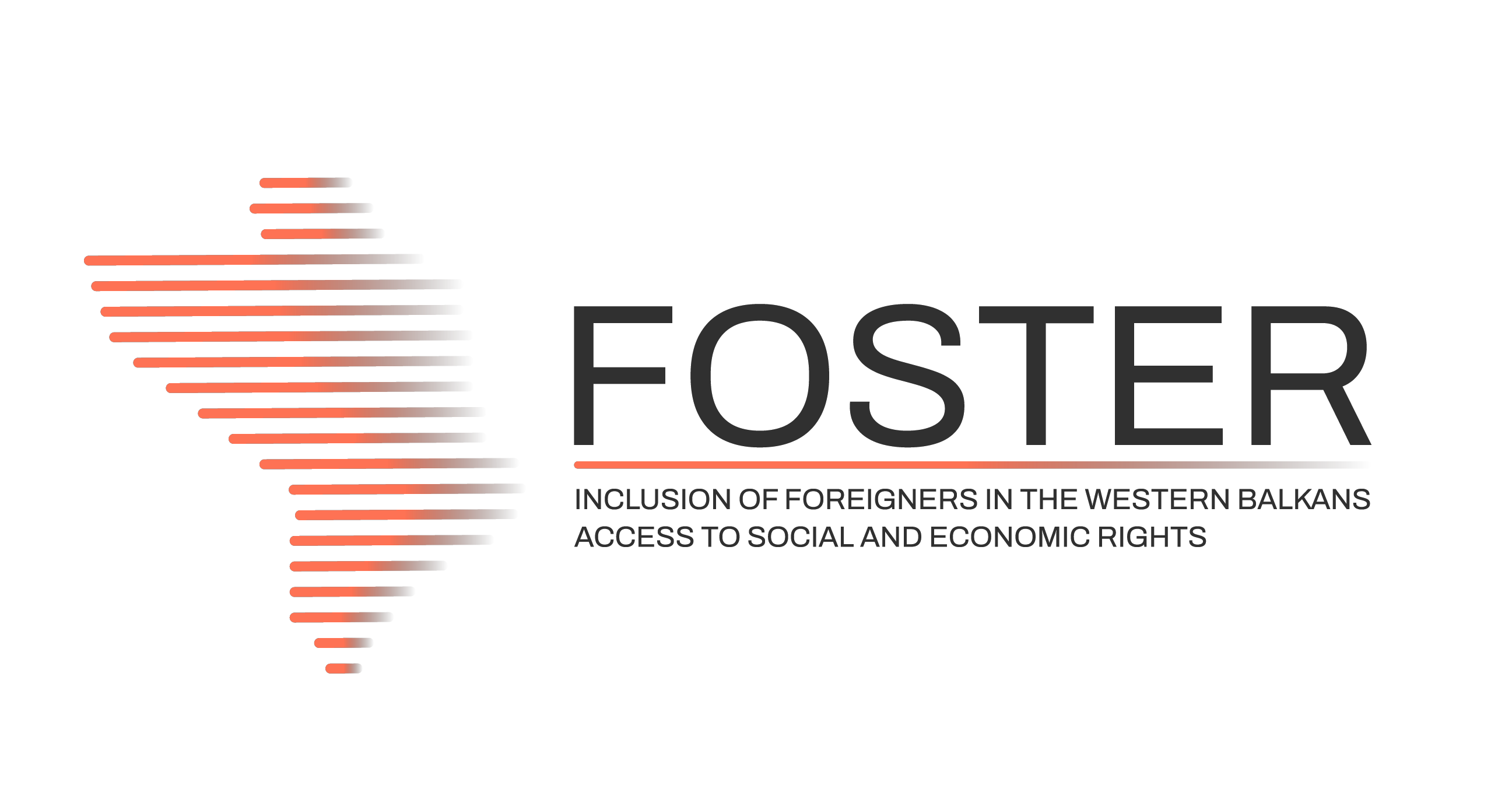 Mar
07
2023
Mar
07
2023
Request for Proposals – Midterm and final evaluation report of project implementation
Terms of Reference
Request: Service provider to measure results and impact of project activities – prepare midterm evaluation and final evaluation report
About Macedonian Young Lawyers Association (MYLA)
Macedonian Young Lawyers Association (MYLA) is а non-governmental, non-profit and non-political professional organization of lawyers established in December 2003, aiming to strengthen the contribution of young lawyers in promoting the legal profession and fulfilling the principle of the rule of law.
MYLA aims to ensure that the law in North Macedonia works for everyone, serves the public interest and is aligned with international and EU standards. To achieve this, MYLA leads a group of dedicated young lawyers who provide legal aid to the poor and marginalized, litigate public interest cases, encourage and support changes in policies and build the capacities of state institutions, CSOs, legal professionals and individuals.
MYLA has three strategic aims (priorities):
MYLA addresses specific issues relevant to our society that are critical in advancing our mission. The issues are identified through situation analysis, research and communication with stakeholders. MYLA’s target groups are: people living in poverty, stateless persons, victims of human rights violations, discrimination and violent crimes, children, woman, asylum seekers, migrants, prisoners and other marginalized groups.
MYLAs driving force are its core values: liberty, equality and justice for every human being; empowerment of the poor, marginalized and underrepresented; protection of the environment; collegiality and participative decision-making processes in the organization; professionalism, excellence and integrity; collaboration with all stakeholders; transformation and responsiveness.
Project background
The project “Building Resilient and Inclusive Communities” (BRIC) supported aims to build local resilient communities against violent extremism and radicalization through capacity building and support to communities and vulnerable groups in the process of the P-CVE and rehabilitation and reintegration (R&R) in the country.
With the intervention the project strives to boost the existing institutional P-CVE and R&R at central and local level to make them responsive through active engagement in the process of PCVE and R&R for the persons in need, and strengthen the communities to become resilient against VE by promoting social cohesion and alternatives. The actions of the project are aligned and compatible with the national strategic documents for P-CVE, the national plan for R&R and the country’s need to properly address these issues and to improve the services while providing adequate support to individuals and communities in need.
The activities are focused on conducting assessment on socioeconomic aspects of VE, development of operational documents and capacity building of state institutions at central and local level and other involved actors, facilitate peer to peer experience sharing within the Balkan region and activities that will support the community engagement and social cohesion for students, local no state actors, media and religious groups.
The project is funded by the Global Community Engagement and Resilient Fund (GCERF) and implemented by Macedonian Young Lawyers Association (MYLA) as lead in partnership with Open Gate La Strada, Search for Common Ground and Center for Tolerance and Long-Life Learning.
Deliverable: Purpose, scope and objective
The selected service provider will develop a midterm and final evaluation report.
A midterm evaluation report is an analysis describing the situation in the middle of intervention ( implementation of activities), the impact from the intervention and achievement of the targets for outcome and outputs indicators as outlined in the M&E framework. The findings from the midterm report will enable MYLA to adjust and revise the targets outlined in the M&E framework. The midterm evaluation report will cover the period from 1 July 2021 – 31 December 2022.
A final evaluation report will cover the entire implementation period of the project 1 July 2021-31 June 2024. The report will assess the impact, progress and achievement of the target for outcomes and outputs after the intervention ( implementation of the project). The finding will show the extent to which the project was successful in addressing desired issues against outlined output and outcome targets, the intended impact from the intervention of the project and conclusion and recommendations for further improvement. The final evaluation report will be produces after the completion of the implementation of the project, set in 31 June 2024.
With the successful service provider, MYLA will share the baseline report as well as the necessary information, contacts and project documentation.
with the project.
Deliverables
Methodology of the evaluation
The service provider is encouraged to use combined methodologies, quantitative and qualitative sources to gather the necessary data for the preparation of the reports, findings and recommendations.
The combined methodology of collection of data include but its not limited to:
- Review of existing documentation (project documentation, reports, evaluations, researches and analysis, statements of participants, etc)
Desk review of relevant documents (policies, guidance, reports, analysis and other materials related to P-CVE and R&R, etc).
- Quantitative and qualitative data using questionnaires, focus, groups, meetings, interviews, free access to information, media articles, project documentation, evaluation forms/reports from implemented activities, participants statements, etc.
The data will be disaggregated by age, gender and if applicable other classifications such as ethnicity, location, education, etc.
Report content:
The reports should include the following:
- Title page
- Executive summary
- Acronyms
- Table of content
- Purpose Coverage and Scope
- Methodology
- Limitations of the report
- Analysis of the findings ( disaggregated data, tables, figures, descriptive analysis)
- Conclusion and Recommendations
- Annexes
Evaluator/s requirements
The service provider (or team) must fulfill the following competencies:
- University degrees in relevant field ( social science, economics, statistics, or related)
- Knowledge, skills, and experience in research and evaluation (including on similar sensitive and often taboo topics);
- Knowledge and understanding of the context of violent extremism/ radicalization and P-CVE
- Knowledge of English and local language/s;
- Experience in screening, analyzing and summarizing data
- Experience and skills in design of methodologies and tools to collect data
- Experience in data analysis and interpretation;
- Experience in writing comprehensible and concise reports;
The service provider must comply with all applicable laws and regulations, data protection policies/principles and adhere to a strict confidentiality policy in relation to client information.
Safety and security
The security of community members should be of primary consideration, bearing in mind the sensitivity of some of the issues that may be covered. Information gathered in surveys and interviews is personal and potentially sensitive. Respondents should be reassured that the provided information will be kept anonymous. Under no circumstances should interviewees be pressured to respond to all or some questions or items. Parental consent must be obtained before interviewing minors.
The service provider is requested to gather signed consent forms of each individual participating in the baseline assessment. It should be made possible to withdraw the consent at any point during the baseline assessment. If a panel survey data for a small sample of individuals is selected, the service provider shall request the explicit consent of the individuals that will be traced during the period of the grant, as well as some form of means of communication with the individual, such as email, or telephone. This data shall be strictly secure and be only accessible to the consultant and MYLA
Timeframe
Implementation period for midterm evaluation: 15 March – 15 April 2023. The precise dates will be confirmed with the selected evaluator/s. The final report must be completed by 30 April 2023.
| Task | Indicative period |
| Conduct desk research and review of project documentation ( data gathering and analysis, project information, relevant reports) | March 2023 |
| Conduct data collection ( interview, focus groups, meetings with relevant stakeholders). Prepare initial findings and recommendations | March-April 2023 |
| Draft report and brief to MYLA | By 15 April 2023 |
| Final report | By 30 April 2023 |
Implementation period for the final evaluation: TBD between MYLA and the evaluator following the completion of the implementation of the project
Submission of application
Interested evaluators are invited to submit the below as part of the application:
- CV of evaluator/s ( team)
- Proposal outlining the proposed methodology for the evaluation, data analysis techniques, quality control measures, timelines, and proposed budget. The budget should be all inclusive, including all fees, travel, daily subsistence allowance, equipment, data collection and other costs
- Two samples of previous work
Deadline for submission of the application
Proposals should be sent to MYLA by 15 of March 2023, at contact@myla.org.mk or in hard copy at Donbas 14/1-6, 1000, Skopje, North Macedonia. The applicant in the subject will quote: Application for preparation of baseline report P-CVE – R&R. Applications received after the deadline will not be considered.
Selection of the proposals
The proposals will be selected by a committee from MYLA and/or in consultation with the donor.
The winning application will be selected following a number of criteria, including:
- The quality of proposal and timely completion of the evaluation materials
- Previous experience
- Balance of theory and practical information in developing materials.
- Proposed approach and methodology
- Financial offer – cost-effectiveness
The ToR can be downloaded here.




